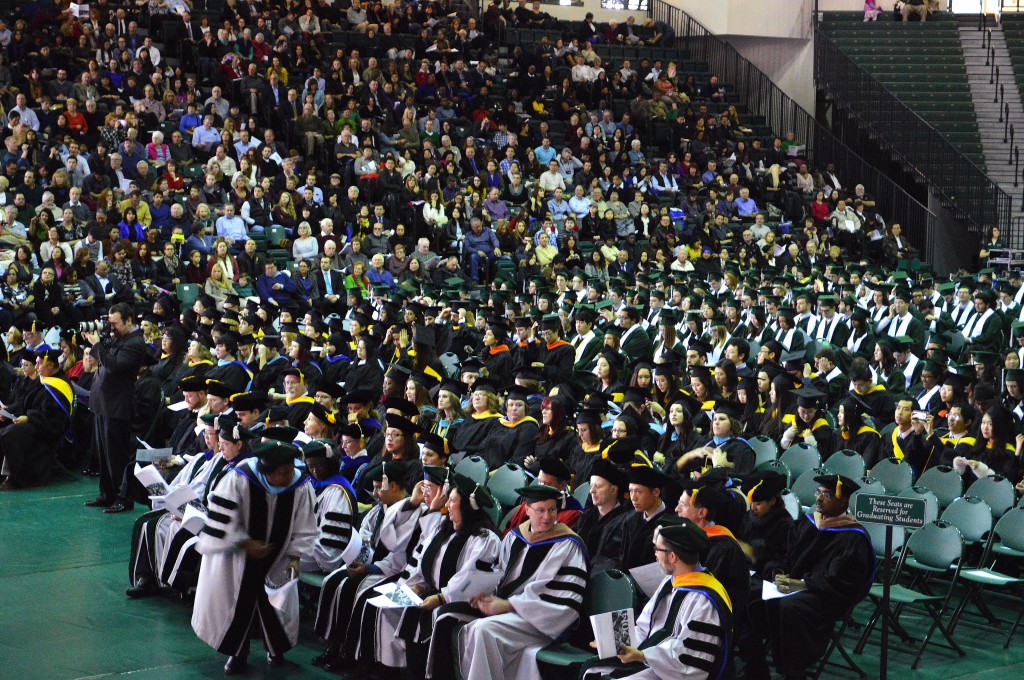By the time Jeremy Min sits down for his first final exam on Thursday, he will already be a Binghamton University alumnus.
“It’ll be a little hard for me to enjoy my graduation because I’ll have to start thinking about finals again,” Min said.
Min, a senior double-majoring in history and political science, is one of 307 students who received their bachelor degrees in the fall 2014 commencement ceremony on Dec. 14, and he will be among the seniors who completed their degrees in less than four years.
With tuition, fees and housing, costing in-state students $22,000 per year and thousands more for out of state students, many look to save money by graduating early.
To do so, those like Min overload more than 18 class credits a semester in order to quickly finish up degree requirements. Others take summer and winter courses to expedite the process.
In addition to taking heavy course loads, many students are now starting school with a substantial amount of credits. According to Katherine Collette, an undergraduate adviser for the School of Management, the increased number of Advanced Placement high school classes means that undergraduates are entering Binghamton armed with enough credits to make early graduation possible.
“It’s not unusual for a student to come in with a year’s worth of credits done already,” Collette said. “They’re already sophomores in term of standing.”
Niketa Hyder will be graduating three semesters ahead of her classmates. Hyder, a junior majoring in psychology, came to BU with 60 college credits from her high school, which offered an accelerated program. For Hyder, one of the difficult aspects of graduating early was managing upper level course loads as a freshman.
“It was hard establishing a routine, figuring out how I should study and get my work done,” Hyder said.
While short-term financial need motivates some students to complete degree requirements early, Jill Seymour, an adviser and the associate director of Harpur Academic Advising, cautioned students against rushing to finish their degrees at the expense of missing out on valuable experiences.
“They may miss the opportunity to do things like study abroad, add another major or minor or have to forego internships because they are packing their schedule with only the essentials,” Seymour wrote in an email.
Missing out on experiences can negatively impact how potential employers may perceive a graduate’s ability to function in the workplace, said Kelli Smith, the director of University Career Services at the Fleishman Center for Career and Professional Development.
“An employer might see you as overly, what they call, book smart and not able to apply what you learned to the real world or you haven’t proven that yet,” Smith said.
Dan Black, Ernest and Young Americas director of campus recruiting, agreed that there was value in hiring older graduates.
“There is something to be said for spending more time interacting with other students pursuing the same discipline,” Black said. “Students can learn more about teaming, exchanging ideas and being challenged by other bright college students, which are all beneficial activities that can enhance an individual’s career readiness.”
But Alison Ganci, who graduated a year early from BU last semester and is now a first-year graduate student studying accounting, said she felt that her accelerated undergraduate career made her stand out when applying to jobs.
“They want to see that you’re committed to learning things,” Ganci said. “I saw it as an advantage. I was really involved in my studies and I was really proactive.”
Seniors graduating this semester still face a weak job market. According to statistics from the Economic Policy Institute, the unemployment rate for young college graduates aged 21 to 24 is 8.5 percent while the national unemployment rate is 5.8 percent. For graduates who have several months before they start their careers or school, the slimmer job prospects are concerning.
Jessica Swetland, a senior double-majoring in biology and Spanish said that she’s trying to find a job at home while she interviews at medical schools.
“It seems silly to me that I’ll be a college graduate and I still won’t be able to find a minimum wage job,” Swetland said.
Despite these concerns, some seniors, such as Justin Craig, are just glad to be finished with school work and moving on to the next phase of their lives.
“I’m glad to be done with school and classes and homework,” said Craig, a cinema major. “I’m excited to be an adult but the responsibility will be tough.”
For Natalie Murphy, a senior majoring in English, leaving BU and starting her career will be bittersweet because she won’t be graduating with her friends. She decided to graduate early for financial reasons but is taking a six-month public affairs internship with Disney.
“I’m in the last semester mindset and all my friend are in the second-to-last semester mindset,” Murphy said. “I’m going through all these milestones like the last Thursday night or the last study session in Bartle and I’m going through that emotional toll by myself.”



